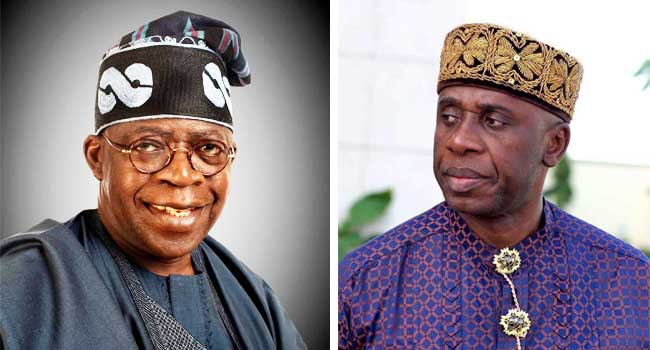Suspension of Fubara and Others: This Illegality Cannot Stand – Amaechi Tells Tinubu
The political landscape in Nigeria has been thrown into a deep state of contention following the suspension of Governor Siminalayi Fubara of Rivers State, his deputy Ngozi Odu, and members of the Rivers State House of Assembly. The move was orchestrated by President Bola Ahmed Tinubu, a decision that has sparked intense backlash across the country. The former Governor of Rivers State and ex-Minister of Transportation, Rotimi Amaechi, has been particularly vocal in his condemnation of the action. In a powerful statement released on March 19, 2025, Amaechi described the suspension as “undemocratic, unconstitutional, and a brazen violation of Nigeria’s Constitution,” calling for an urgent rejection of the move by national stakeholders, including the National Assembly, state governors, and all Nigerians of goodwill.
Amaechi’s criticism of President Tinubu’s suspension order is grounded in a deep concern for the preservation of Nigeria’s democratic principles and constitutional integrity. He points to a clear constitutional violation by the President, accusing him of overstepping his bounds in a manner that undermines the sovereignty of state governments. The former governor, who has a long history of political engagement and leadership in Nigeria, stresses that the suspension of elected state officials such as governors and their deputies can only occur through the legal and constitutional process of impeachment, as outlined in Section 188 of the Nigerian Constitution. According to Amaechi, the President’s actions are an unlawful exercise of power that lacks any legal foundation.
In his statement, Amaechi highlights the democratic nature of Nigeria’s governance system, which is built on the principle of separation of powers and respect for the rule of law. He underscores the fact that no individual, no matter their office or political standing, has the right to suspend or remove an elected official except through the mechanisms enshrined in the law. For Amaechi, the suspension of Fubara, Odu, and the members of the Rivers State House of Assembly is not only an attack on the principle of democracy but also an attempt to destabilize the political landscape of the state.
Amaechi’s legal argument is anchored in the specific provisions of the Nigerian Constitution that deal with the removal of a sitting governor. Section 188 of the Constitution lays out the impeachment process, which involves the state legislature and a series of procedural safeguards designed to ensure that any removal of an elected governor is carried out fairly, justly, and in accordance with the rule of law. The Constitution explicitly states that a governor can only be removed through impeachment, a process that requires a formal petition, investigations, and a vote by the state legislature.
For Amaechi, the President’s suspension of Fubara and other elected officials represents an illegal bypassing of these constitutional processes. He argues that by unilaterally issuing a suspension order, President Tinubu is not only disregarding the letter of the law but is also setting a dangerous precedent that could lead to the erosion of democratic values and practices in the country. Amaechi further contends that such actions, if left unchecked, would undermine the foundation of Nigeria’s federal system and erode the autonomy of state governments, placing them under undue influence from the central government.
Another point of contention in Amaechi’s critique of the suspension is President Tinubu’s invocation of Section 305 of the Nigerian Constitution. This section grants the President the power to declare a state of emergency in any state of the federation under certain conditions, such as in the event of an outbreak of violence, a breakdown of law and order, or other forms of national crisis. However, Amaechi argues that Section 305 does not give the President the authority to dissolve or suspend elected state officials or legislative bodies, as it is intended only to address emergency situations that threaten public safety and security.
In Amaechi’s view, the use of Section 305 in this case is both inappropriate and misleading. The suspension of Governor Fubara and the members of the state assembly cannot, in any reasonable sense, be justified as an emergency. There has been no declared crisis in Rivers State that would warrant such drastic intervention by the President. Therefore, Amaechi questions the legal basis for invoking a clause meant for times of national distress to justify what he perceives as a political maneuver aimed at consolidating power in the hands of the central government.
Amaechi’s statement is not only a critique of the specific suspension of Fubara and his colleagues but also a broader call to action for all Nigerians and political leaders who believe in the preservation of democracy and the rule of law. He urges the National Assembly, state governors, and other political stakeholders to speak out against what he describes as an “illegal power grab” by the President. According to Amaechi, this is a moment for the political elite to demonstrate their commitment to Nigeria’s democratic values and to resist any attempts to centralize power in ways that undermine the Constitution.
His call extends beyond the political class, appealing to the wider Nigerian public to recognize the gravity of the situation. Amaechi warns that if such actions are allowed to stand, they would mark a dangerous shift in Nigeria’s political trajectory, taking the country closer to authoritarianism and away from the democratic ideals that have been fought for over decades. In his view, the suspension represents more than just a violation of the Constitution; it is an attack on the very fabric of Nigeria’s democratic experiment.
Amaechi’s concerns are shared by many political observers who view the President’s actions as a direct challenge to the balance of power between the federal government and the states. By using the suspension of state officials as a tool of political control, President Tinubu risks stoking greater divisions within the country, potentially creating a precedent for future political conflicts and undermining the spirit of federalism that is meant to guide Nigeria’s governance.
Amaechi’s condemnation also reflects broader concerns about the relationship between the federal government and state governments in Nigeria. In recent years, there have been growing tensions over the perceived overreach of the central government into matters traditionally within the purview of state governments. Issues such as resource control, fiscal autonomy, and the devolution of power have long been contentious in Nigeria, with many state leaders arguing that the federal government has consistently encroached on their constitutional rights and powers.
Amaechi’s statement suggests that the suspension of Fubara and others may be part of a larger pattern of attempts by the federal government to assert greater control over the states, particularly in opposition-controlled areas like Rivers State. The political rivalry between Amaechi and Tinubu, as well as the broader divide between their respective political factions, also adds a layer of complexity to the situation. However, Amaechi’s concerns transcend personal or party politics, focusing instead on the survival of Nigeria’s democratic structures and the need for all stakeholders to uphold the rule of law.
In the wake of the suspension, several state governors, particularly those from opposition parties, have expressed their concern about the implications of such a move. Many have rallied behind Amaechi’s call to reject the suspension and to defend the Constitution. Governors from states like Benue, Enugu, and Delta have emphasized the need for the country to uphold democratic principles and to resist any attempt to undermine the independence of state governments.
Furthermore, lawmakers in the National Assembly have also expressed alarm at what they see as a dangerous precedent. Some have called for an urgent review of the situation and for legal actions to be taken to address what they describe as an unconstitutional move by the President.
The suspension of Governor Fubara and others in Rivers State raises critical questions about the future of democracy in Nigeria. Will the country continue to uphold the rule of law and respect for constitutional procedures, or will political power be increasingly concentrated in the hands of the central government? Amaechi’s statement highlights the critical juncture at which Nigeria finds itself, urging political leaders and citizens alike to take a stand for democracy and constitutionalism.
As the political drama unfolds, it remains to be seen whether the federal government will reverse its decision or whether further political and legal battles will ensue. What is clear, however, is that this issue will likely have long-term consequences for the political trajectory of Nigeria, and it will test the resilience of the country’s democratic institutions.
For now, Amaechi’s call remains a strong reminder that democracy is fragile, and the protection of constitutional order is the collective responsibility of all Nigerians, regardless of their political affiliations. The country’s future will depend on its ability to navigate this crisis with respect for the rule of law, the sanctity of democratic processes, and the preservation of political pluralism.





